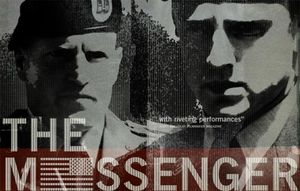
American movie trends that develop during wartime provide fascinating historical perspective. The fatalistic vision and confrontational nature of a new cinema defined the Vietnam era with Easy Rider, Bonnie & Clyde, The Graduate and even Butch Cassidy informed by the conflict. And it is no accident that the Saw series and its new sub-genre, torture porn, thrived in the post-9/11 Bush era. During the Iraq and Afghanistan invasions, there have also been several movies that have gone right to the front lines. More movies have been made about these wars during the time of the conflict than any other in American history. A spate of documentaries have recorded the war. And a trickle of narrative films—modestly-budgeted pictures released by studio specialty arms—have made it to theaters. Heavier on emotion and contemplation than action (even the butch Hurt Locker was food for thought) these have been thought-provoking works that allow moviegoers to process the war.
The Messenger is all about the processing. Opening this week, the film follows two soldiers, played by Woody Harrelson and Ben Foster (previously a teen love interest on Six Feet Under), assigned the duty of next of kin notification when a soldier dies in combat. During a war in which images of the dying and the dead have been censored by the government, the film derives its power from forcing you to look. Not at gruesome images, but at those who have been wounded by loss. Long, unflinching takes of notification scenes linger beyond the audience’s comfort zone. And just as the audience and the NOK (as the next of kin are referred to in the film) are forced to face this pain, the protagonist soldiers must also come to grips with their role in the process. Harrelson’s grizzled vet and Foster’s disillusioned youth forge a common bond over their duty, how it is to be performed and their own status as men increasingly disturbed by their service.
This first time directorial effort from Oren Moverman (screenwriter of Jesus’ Son among others) captures the emotional vibe well. He also handles plot and character contrivances well, not letting them take over; a relationship between Foster and a widow played by Samantha Morton only manages to blossom into a non-romance. The cast is solid throughout, particularly Foster and Steve Buscemi in a brief role as a grieving father.
Like In The Valley of Elah, The Messenger is a film about how the wars have affected life at home. Both films offer a strong perspective of our situation, but The Messenger is less overtly political (the film received the assistance of the military; Elah did not). Given how long films take to make and release, the fact that these movies exist during the period of military action is a testament to the filmmakers and studio who get them made on the screen. The wars, however, linger on, rendering this speed-to-market less of an achievement.
–Pops Corn
